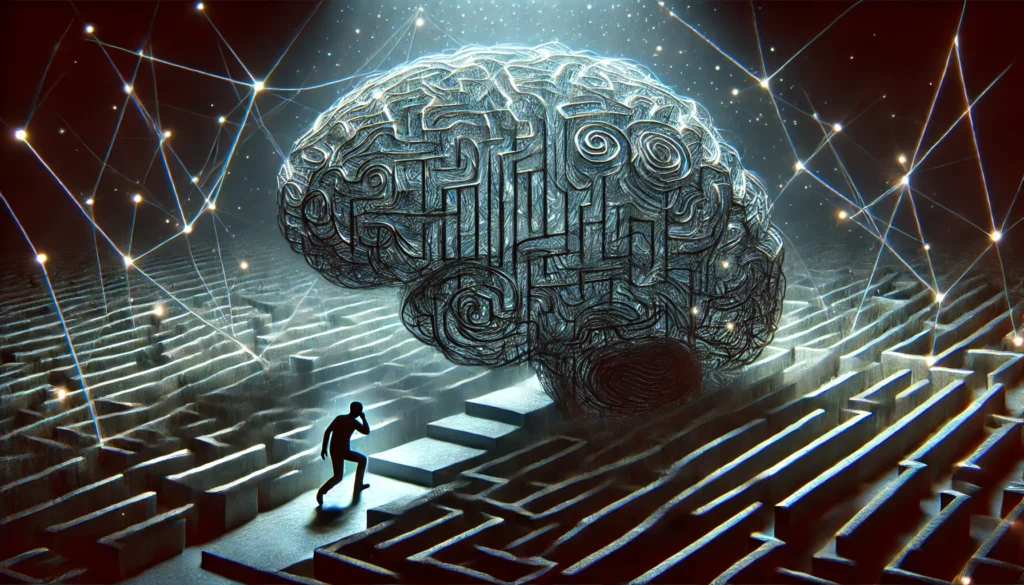Anxiety is a common emotional response experienced by many individuals across various situations. However, its effects extend beyond the immediate sensations of nervousness or panic. One of the more insidious impacts of anxiety is its interference with memory function. In this comprehensive exploration, we delve into how anxiety can affect memory, drawing on scientific insights and practical advice to guide individuals seeking to mitigate these effects.
You may also like: Understanding the Science Behind Lost Memory
The Connection Between Anxiety and Memory
Understanding the connection between anxiety and memory requires a dive into the brain’s intricate workings. Anxiety often triggers the body’s stress response, releasing hormones like cortisol and adrenaline. These hormones can have a profound impact on brain areas critical for memory, such as the hippocampus and the prefrontal cortex.
The Brain’s Response to Anxiety
When anxiety strikes, the brain’s immediate response is to prioritize survival. This primal reaction can overshadow other cognitive functions, including memory processing. The amygdala, responsible for emotional processing, becomes hyperactive, potentially affecting the balance between emotional and rational responses in the brain.
Hormonal Influence on Memory
The release of stress hormones during anxious moments can significantly alter brain chemistry. Cortisol, in particular, is known to impede the function of the hippocampus, a brain region essential for converting short-term memories into long-term ones. This hormonal surge can lead to a temporary disruption in memory encoding and retrieval processes.
Impact on Neural Pathways
Anxiety can also affect the neural pathways involved in memory formation. The heightened state of alertness caused by anxiety can lead to an overload in neural circuits, resulting in diminished cognitive efficiency. This overload can cause the brain to struggle with effectively processing and storing new information.
Can Stress and Anxiety Cause Memory Problems?
Scientific studies suggest a robust correlation between anxiety and memory impairment. When the brain perceives a threat, it prioritizes survival over other functions, including memory processing. The heightened state of alertness and arousal can interfere with the brain’s ability to encode and retrieve memories, leading to forgetfulness or even memory loss.
Research Findings on Memory Impairment
Numerous studies have documented the impact of anxiety on memory, revealing how stress-induced hormonal changes affect cognitive performance. Research indicates that individuals with high anxiety levels often display poorer memory recall, especially in high-pressure situations. This is due to the brain’s limited capacity to handle concurrent stressors and cognitive tasks.
Emotional Stress and Memory Blockages
Emotional stress, a common byproduct of anxiety, can lead to mental blockages that hinder memory retrieval. When faced with emotional distress, the brain may become preoccupied with managing stress, leaving little room for accessing stored memories. This can result in the frustrating experience of knowing you should remember something but being unable to access it.
The Role of Chronic Stress
Chronic stress exacerbates the detrimental effects of anxiety on memory. Over time, prolonged exposure to stress hormones can lead to structural changes in the brain, particularly in the hippocampus. These changes can impair the brain’s ability to form new memories and maintain existing ones, leading to more persistent memory challenges.
Anxiety and Forgetfulness
The experience of anxiety and forgetfulness often go hand in hand. Those with anxiety may find themselves struggling to recall information or make decisions. This can be attributed to the brain’s divided focus, where the anxiety response monopolizes cognitive resources, leaving fewer available for memory retention.
Cognitive Load and Memory Recall
Anxiety increases cognitive load, making it difficult for the brain to juggle multiple tasks. This heightened cognitive demand can impair memory recall, as the brain’s resources are stretched thin. As a result, individuals may find it challenging to concentrate, leading to frequent forgetfulness.

Decision-Making Under Anxiety
Decision-making can become particularly challenging under anxiety, as the brain struggles to process information efficiently. The stress of making the right choice can cloud judgment, further impairing the ability to recall crucial information needed for informed decisions. This cycle can perpetuate anxiety, creating a feedback loop that worsens memory issues.
Strategies for Improving Focus
To combat anxiety-induced forgetfulness, individuals can adopt strategies to enhance focus and memory retention. Techniques such as breaking tasks into smaller, manageable parts and using memory aids like lists or notes can help reduce cognitive load. These strategies allow the brain to allocate resources more effectively, improving memory recall.
Short-Term Memory and Stress
Short-term memory, which involves the temporary storage of information, is particularly susceptible to the impacts of stress and anxiety. Stress hormones can alter the neurotransmitter systems responsible for short-term memory, disrupting the brain’s communication pathways.
Neurotransmitter Disruption
Stress-induced changes in neurotransmitter levels can significantly impact short-term memory. Neurotransmitters like dopamine and serotonin play key roles in maintaining attention and cognitive function. When their balance is disrupted by stress, it can lead to difficulties in retaining and recalling information.
Brain Communication Pathways
The brain relies on intricate communication pathways to process and store information. Stress can disrupt these pathways, leading to lapses in memory. This disruption can manifest as difficulty concentrating, trouble following conversations, or forgetting recent events.
Coping with Short-Term Memory Loss
While short-term memory loss can be distressing, there are coping strategies that can help mitigate its effects. Techniques such as mindfulness exercises, which promote mental clarity, and engaging in memory-training activities can strengthen the brain’s resilience against stress-induced memory disruptions.
Long-Term Implications of Anxiety on Memory
Chronic anxiety can have lasting effects on memory, potentially leading to more severe cognitive impairments over time. Long-term exposure to stress hormones can damage the hippocampus, a critical region for memory formation and retrieval.
Structural Changes in the Brain
Research has shown that chronic anxiety can lead to structural changes in the brain, particularly in areas associated with memory. These changes can result in reduced hippocampal volume, which is linked to impaired memory formation and retrieval. Understanding these structural alterations can provide insights into the long-term cognitive effects of anxiety.
The Impact on Cognitive Aging
Chronic anxiety not only affects memory but can also accelerate cognitive aging. The prolonged presence of stress hormones can lead to faster deterioration of brain cells, impacting overall cognitive health. This acceleration in cognitive decline can make individuals more susceptible to memory-related issues as they age.
Preventive Measures for Long-Term Effects
To prevent long-term memory impairments due to anxiety, adopting proactive measures is essential. Regular mental and physical exercises, stress management techniques, and a healthy lifestyle can help protect brain health. By maintaining a balanced approach to life, individuals can reduce the risk of long-term memory challenges associated with chronic anxiety.
Practical Strategies to Mitigate Anxiety-Induced Memory Issues
While the relationship between anxiety and memory can be daunting, there are practical strategies individuals can employ to mitigate these effects.
Mindfulness and Relaxation Techniques
Mindfulness practices, such as meditation and deep breathing exercises, can help regulate the body’s stress response, reducing anxiety levels and improving memory function. These techniques promote relaxation and enhance cognitive focus, enabling better memory retention.
Meditation for Memory Enhancement
Regular meditation practice can improve attention and reduce stress, creating a conducive environment for memory retention. By focusing on the present moment, individuals can train their minds to avoid distractions, thereby strengthening the brain’s memory processes.
Deep Breathing for Stress Reduction
Deep breathing exercises activate the parasympathetic nervous system, counteracting the stress response. This practice can lower cortisol levels, reducing anxiety and its negative impact on memory. Incorporating deep breathing into daily routines can help maintain calmness and mental clarity.
Progressive Muscle Relaxation
Progressive muscle relaxation involves tensing and then relaxing muscle groups to reduce physical tension and anxiety. This technique can help individuals achieve a state of relaxation, improving focus and memory performance. Regular practice can enhance the body’s ability to manage stress effectively.
Cognitive Behavioral Therapy (CBT)
CBT is a therapeutic approach that can help individuals manage anxiety by changing negative thought patterns and behaviors. By addressing the root causes of anxiety, CBT can reduce its impact on memory, leading to improved cognitive function over time.
Identifying Negative Thought Patterns
CBT helps individuals identify and challenge negative thought patterns that contribute to anxiety. By recognizing these patterns, individuals can develop healthier ways of thinking, reducing anxiety’s hold on their cognitive functions, including memory.

Behavioral Strategies for Anxiety Management
Through CBT, individuals can learn behavioral strategies to cope with anxiety. Techniques such as exposure therapy and systematic desensitization can help reduce anxiety levels, improving overall cognitive performance and memory retention.
Long-Term Benefits of CBT
The long-term benefits of CBT extend beyond anxiety management, supporting overall cognitive health. By fostering a positive mindset and healthy coping mechanisms, individuals can experience lasting improvements in memory and cognitive resilience.
Lifestyle Modifications
Incorporating lifestyle changes, such as regular physical activity, a balanced diet, and adequate sleep, can support brain health and mitigate anxiety’s effects on memory. Exercise, in particular, has been shown to enhance neurogenesis in the hippocampus, improving memory and cognitive resilience.
The Role of Exercise in Memory Improvement
Regular physical activity boosts blood flow to the brain, promoting the growth of new neurons in the hippocampus. This process, known as neurogenesis, can enhance memory and cognitive function. Engaging in aerobic exercises, such as walking or swimming, can be particularly beneficial.
Nutrition and Brain Health
A balanced diet rich in antioxidants, omega-3 fatty acids, and essential vitamins can support brain health. Foods like fatty fish, berries, and leafy greens provide nutrients that protect brain cells and improve memory. Adopting a brain-healthy diet can mitigate anxiety’s impact on cognitive function.
The Importance of Sleep
Adequate sleep is crucial for memory consolidation and cognitive performance. Anxiety can disrupt sleep patterns, exacerbating memory issues. Prioritizing good sleep hygiene, such as maintaining a regular sleep schedule and creating a restful environment, can improve memory and overall well-being.
Future Implications and Research Directions
As research into the connection between anxiety and memory continues to evolve, new insights and therapeutic interventions are likely to emerge. Understanding the biological mechanisms underlying this relationship will be crucial for developing targeted treatments and preventive strategies.
Anxiety, Memory, and Nootropics
The field of nootropics, or cognitive enhancers, holds promise for individuals seeking to optimize memory function in the face of anxiety. While more research is needed, certain nootropic supplements, such as omega-3 fatty acids and Ginkgo biloba, may offer potential benefits for cognitive health.
Investigating Nootropic Efficacy
Ongoing research is exploring the efficacy of various nootropic supplements in enhancing memory and reducing anxiety. Preliminary findings suggest that these substances may support brain health by promoting neuroplasticity and improving neurotransmitter balance.
Potential Benefits of Omega-3 Fatty Acids
Omega-3 fatty acids, found in fish oil and certain plant oils, have been associated with improved cognitive function. These essential fats support brain cell structure and communication, potentially mitigating anxiety’s impact on memory. Further studies are needed to confirm these benefits.
Ginkgo Biloba and Cognitive Health
Ginkgo Biloba, a herbal supplement, is believed to enhance blood flow to the brain, supporting cognitive function. While its effects on memory are still under investigation, it offers a promising avenue for individuals seeking natural ways to support their cognitive health amidst anxiety.
Technological Advances in Memory Support
Technological advancements, including neurofeedback and brain stimulation techniques, are being explored as potential tools for supporting memory function in individuals with anxiety. These interventions aim to modulate brain activity, enhancing cognitive performance and resilience.
Neurofeedback for Cognitive Enhancement
Neurofeedback involves training the brain to regulate its own activity, potentially improving cognitive functions such as attention and memory. This non-invasive technique shows promise for individuals seeking to enhance memory performance in the context of anxiety.
Brain Stimulation Techniques
Techniques like Transcranial Magnetic Stimulation (TMS) are being studied for their potential to improve cognitive function. By targeting specific brain areas, TMS may enhance neural connectivity and memory processes, offering a novel approach to addressing anxiety-induced memory challenges.
The Future of Cognitive Technology
As technology continues to advance, new tools and applications for cognitive enhancement will emerge. These innovations hold the potential to revolutionize how we approach memory support and anxiety management, providing new hope for individuals facing cognitive challenges.

Conclusion
The interplay between anxiety and memory is complex, with significant implications for individuals’ cognitive health and well-being. By understanding the mechanisms underlying this relationship and adopting practical strategies to mitigate its effects, individuals can take proactive steps to preserve and enhance their memory function. As research continues to unfold, new opportunities for intervention and support are likely to arise, offering hope for those navigating the challenges of anxiety-induced memory issues. Embracing a holistic approach to mental health, which combines scientific insights, therapeutic practices, and lifestyle adjustments, can empower individuals to overcome the cognitive hurdles posed by anxiety.
Further Reading:
How Anxiety Can Cause Forgetfulness
Important Note: The information contained in this article is for general informational purposes only, and should not be construed as health or medical advice, nor is it intended to diagnose, prevent, treat, or cure any disease or health condition. Before embarking on any diet, fitness regimen, or program of nutritional supplementation, it is advisable to consult your healthcare professional in order to determine its safety and probable efficacy in terms of your individual state of health.
Regarding Nutritional Supplements Or Other Non-Prescription Health Products: If any nutritional supplements or other non-prescription health products are mentioned in the foregoing article, any claims or statements made about them have not been evaluated by the U.S. Food and Drug Administration, and such nutritional supplements or other health products are not intended to diagnose, treat, cure, or prevent any disease.


